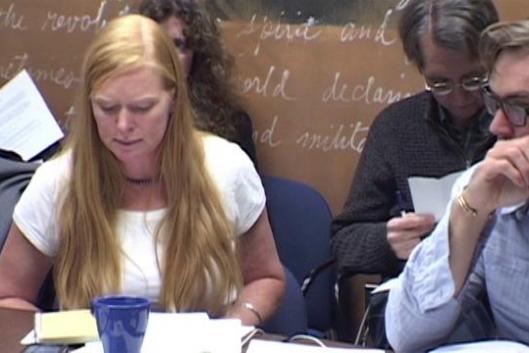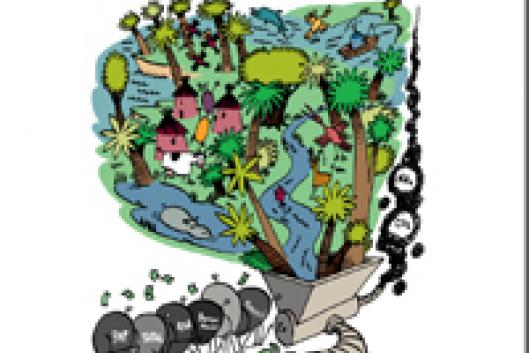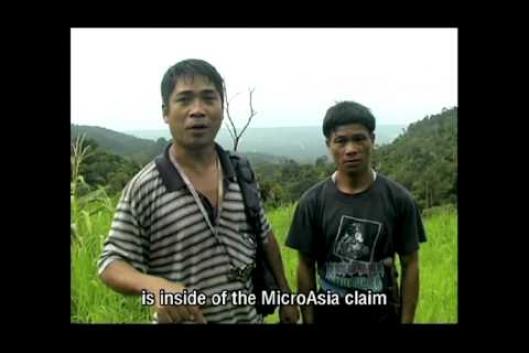It was on August 16 last year that we lost Ricardo Carrere, the international coordinator of the World Rainforest Movement (WRM) for 15 years.
Issue 181 – August 2012
OUR VIEWPOINT
THE FOCUS OF THIS ISSUE: THE FINANCIALIZATION OF NATURE
-
30 August 2012Finan-what? The term “financialization” may sound overly complex and academic, or perhaps even made up. It could lead some people to ask, finan-what? However, it is increasingly being used in civil society debates and reflections, particularly with regard to the growing financial speculation tied to the goods and components of nature, including forests, which are of fundamental importance not only for the lives of local communities, but for the entire planet.
PEOPLES IN ACTION
-
30 August 2012The Japanese paper-making company Oji Paper Group runs a paper mill in Nantong, East China, and had plans to build a pipeline for wastewater discharge from the mill. However, in July, thousands of residents in the neighbouring coastal city of Qidong took to the streets in protest amid growing concerns over the pollution the project would cause. They feared that wastewater containing contaminants and toxic matter would be dumped into the sea, polluting the area and killing the local fish stock. The pipeline would discharge around 150,000 tons of wastewater per day. In the end, the company announced that it had dropped its plans, marking a victory for the community.
-
30 August 2012ATM (the Alliance Against Mining), the largest anti-mining network in the Philippines, has issued a press release reporting that President Benigno Aquino III recently signed an Executive Order on mining. The EO focuses on establishing environmental safeguards and the need for a new revenue-sharing scheme, to maximize the country’s profits from mining. It did not mention other concerns of communities, not only in Palawan, but also in other mining-affected areas, such as social impacts and human rights violations. Indigenous peoples from Palawan are firm in their decision to not allow mining in their ancestral domains, as they know its devastating impacts on their lands and the threats it will bring not only to them but also to the future generations.
-
30 August 2012Six Garifuna´s cooperatives that have recovered their land are facingat this moment the threat of paramilitaries who move around on motorcycles and 4x4 vehicles with heavy weapons and could massacre the Garifuna inhabitants who are resisting the dispossession of their ancestral territories. Although these cooperatives have land titles in their favor in the Icotea community, Vallecito, Colon department (Honduras), these lands have been invaded by large landholders advised by Miguel Facusse, with the complicity of Cesar Ham, Minister of National Agrarian Institute (INA). Miguel Facusse is called "the oil palm planter of death" by the peasants of Bajo Aguan, who blame him for usurping their land and countless human rights violations.
-
30 August 2012The Inter-American Court of Human Rights (IACHR) has ruled in favour of the Sarayaku indigenous people of the Ecuadorian Amazon in the case of Sarayaku v. Ecuador. The ruling, made public on July 25, ends a decade-long legal battle waged by the Sarayaku after a foreign oil company was allowed to encroach on their traditional lands in the early 2000s without their consultation. The IACHR found that the Ecuadorian state violated the community’s right to be consulted, as well as their community property rights and their cultural identity. The Court also found Ecuador responsible for putting the life and physical integrity of the Sarayaku at grave risk, after the oil company placed more than 1,400 kg of high-grade explosives on the indigenous people’s territory.
-
30 August 2012A leaflet on the Green Economy and the financialization of nature, published by Friends of the Earth France, ATTAC and AITEC. Available at http://www.amisdelaterre.org/IMG/pdf/nature_is_not_for_sale.pdf
-
30 August 2012Members of farmers’ organizations, women’s movements and civil society organizations from South Africa, Zimbabwe, Malawi, Swaziland, Lesotho, the DRC and Mozambique gathered on August 15-16 in Maputo, Mozambique, to analyze the multi-dimensional global crisis and the response of African governments. Key areas discussed at the meeting were food sovereignty, extractive industries, energy and mega projects, land and water grabs, ecological justice and alternative regionalism. Participants deliberated on alternatives to the dominant capitalist model that keeps this region locked into natural resource exploitation dependency for export-led economic growth.
RECOMMENDED
-
30 August 2012A short animated film about the takeover of nature by financial markets and the real alternatives coming up from civil society. An initiative of SOMO, European ATTAC Network, Food & Water Europe, Friends of the Earth, Carbon Trade Watch, WEED, Ecologistas en Acción, AITEC and Campagna per la riforma della Banca Mondiale. Available at
-
30 August 2012This new report published by Rainforest Foundation Norway and Friends of the Earth Norway documents the political incoherence of the Norwegian government, which spends an annual 500 million US dollars and huge political capital on rainforest protection while investing some 13.7 billion dollars in industries destroying it. Available at http://www.regnskog.no/languages/english/_attachment/29989?_ts=13660256314
-
30 August 2012A video documentary launched on July 27 by ALDAW, showing the cultural values of Palawan and the encroachment of mining operations in ancestral domains. frameborder="0" width="640" height="360">
-
30 August 2012An article that analyzes the law passed in the Brazilian state of Acre in 2010 to create the State System of Incentives for Environmental Services (SISA). The law is considered a model and example for the world; however, it ultimately serves to turn over the state’s natural wealth, including its forests, to the financial speculation market. Available in Portuguese only athttp://terramagazine.terra.com.br/blogdaamazonia/blog/2012/08/14/lei-de-pagamento-por-servicos-ambientais-do-acre-beneficia-mercado-financeiro/




